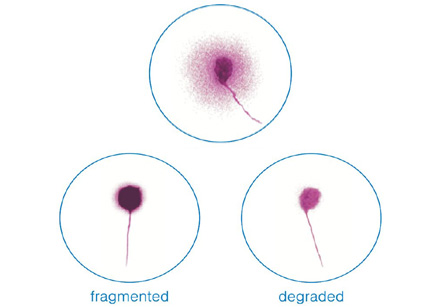Sperm DNA Fragmentation
Introduction
For embryo to develop normally, the genetic integrity of the spermatozoa is essential. A high level of DNA fragmentation in sperm cells may be a cause of male infertility in some couples and this cannot be detected by the conventional examinations such as sperm concentration, motility analysis, or morphology assessment. It is postulated by researchers that in case of any assisted reproductive technology used, an elevated level of DNA fragmentation above a critical limit significantly affects the success and pregnancy rate.
The DNA is a basic genetic material present in the nucleus of each cell of human being in extremely condensed form. The sperm cell is different as the DNA in it is transferred to the embryo. Therefore any problems in this DNA can be reflected as a factor in male infertility.
This test provides a reliable analysis of sperm DNA integrity which helps to identify men who are at risk of failure of initiating a healthy pregnancy. Iran ranks first in the region in terms of infertility treatment studies

Causes of Sperm DNA Fragmentation:
A major causative factor for sperm DNA damage is oxidative stress. Other factors are abnormalities in the regulation of cell death known as apoptosis, or defects in an enzyme (topoisomerase) activity which is important in cell division. Increased sperm DNA fragmentation is associated with:
1. Infection
2. Illnesses causing fever
3. Elevated temperature of testis
4. Diet problems
5. Drug abuse
6. Cigarette smoking
7. Exposure to pollution in environment as well as in occupation
8. Advanced age
9. Varicocele
Indications for Male patients who may benefit from this test:
1. Unexplained infertility
2. Arrested embryo development
3. Poor development of blastocyst
4. Multiple failed IVF or ICSI treatment
5. Recurrent miscarriages in partner
6. Advanced age
7. Varicocele
8. Poor results in semen analysis
9. Exposure to harmful substances
High sperm DNA fragmentation can affect embryo division once the paternal genome stars acting, usually during the subsequent blastocyst development (5 day stage). High level of sperm DNA fragmentation can also be found in men with normal semen parameters.
DNA fragmentation tests:
This test provides a reliable analysis of sperm DNA integrity which helps to identify men who are at risk of failure of initiating a healthy pregnancy.
There are various tests developed by research to assess the percentage of sperm with significant DNA fragmentation. Such tests are TUNNEL assay, COMET assay or recently developed SCSA test or sperm chromatin structure analysis. These tests can measure the fragmentation in thousands of sperm in the ejaculate. Sperm are treated with a chemical to allow entry of a special dye called as fluorescent probe into the sperm cell. This probe interacts with the DNA molecule. Sperm with fragmented DNA takes up more of the dye usually. These changes in affinity for the probe are measured using a procedure called as flow cytometry. Finally, using a computer program, each sperm can be graphed or the percentage of sperm with fragmented DNA can be determined.
Advantages of the Sperm DNA Fragmentation test
This test provides a reliable analysis of sperm DNA integrity which helps to identify men who are at risk of failure of initiating a healthy pregnancy. The sperm DNA integrity information can help in the clinical diagnosis, management and treatment of difficult to diagnose male factors of infertility. It can also guide the fertility specialist treating such couples in assessing the outcome of assisted reproductive techniques.
Treatment of DNA fragmentation:
Many causes of DNA fragmentation cannot be treated, but some treatments and modifications in lifestyle may reduce its levels in few cases. These include:
1. A change in lifestyle and diet designed to prevent oxidative stress.
2. Treatment of infection with antibiotics quickly
3. Efficient repair of varicocele by surgery. This can increase even the pregnancy rates.
4. Keeping the temperature of testes low — no use of hot tubs or long hot baths, and wearing boxer shorts
5. Stopping smoking.
6. Some medications such as steroids and SSRIs should be avoided.
7. Supplementary vitamins and antioxidants such as vitamins C and E, co-enzyme Q-10 and supplements containing carnitine.
The success of these measures can be assessed by a second test three months after the first. ICSI is considered as a more effective treatment than IVF for sperms with a high DNA fragmentation as it requires only one sperm for injecting directly into the ovum.
Results
The results are reported as 3 categories of fertility potential: DNA Fragmentation Index or % DFI means percentage of sperm cells containing damaged DNA.
• Less than 15% DFI = Excellent fertility potential
• More than 15% to less than 30% DFI = good fertility potential
• More than 30% DFI = fair to poor fertility potential (subfertility)
The higher the level of fragmentation, the greater is the incidence of pregnancies not reaching term and also the miscarriages.